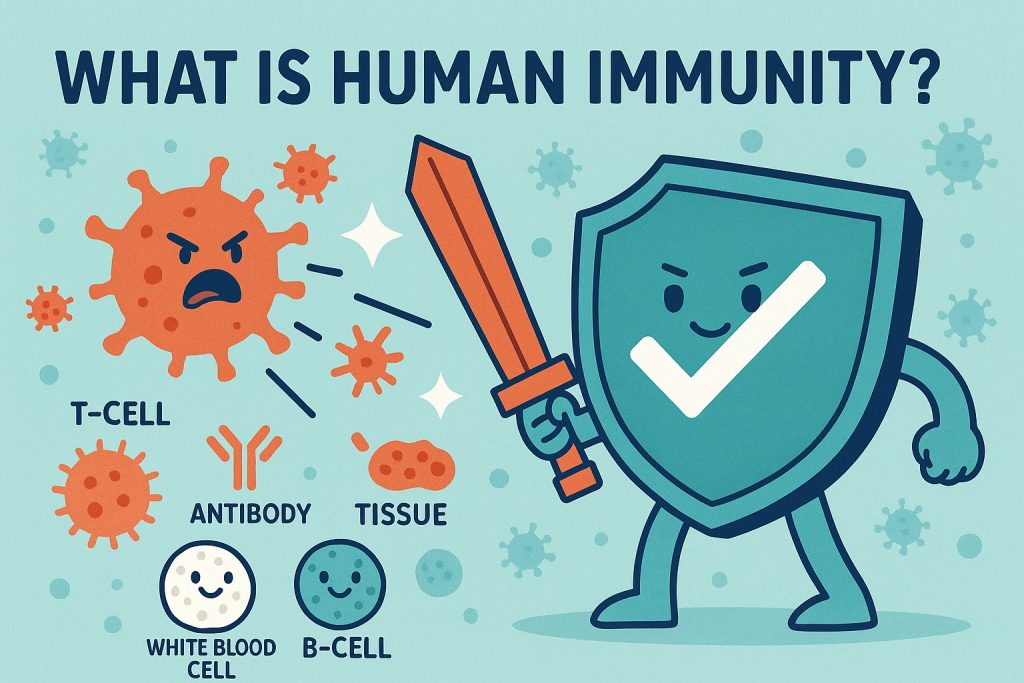The human immune system is one of the most complex and vital defense systems in the body. It works silently and constantly to protect us from bacteria, viruses, fungi, parasites, and even harmful internal changes such as cancer. Without immunity, even a common cold could be life-threatening. But what exactly is immunity, and how does it work?
What Is Immunity?
Immunity is the body’s ability to recognize and defend itself against harmful invaders like pathogens (disease-causing microbes) or abnormal cells. It involves a wide network of cells, tissues, and organs that work together to detect threats, respond appropriately, and remember past encounters to respond faster in the future.
There are two main types of immunity: innate (natural) and adaptive (acquired).
1. Innate Immunity (First Line of Defense)
This is the immune system you’re born with. It provides a fast and general response to all kinds of pathogens.
Key components:
- Skin and mucous membranes – physical barriers that block entry
- White blood cells (e.g., macrophages, neutrophils) – engulf and destroy invaders
- Inflammatory response – signals an area is under attack and activates immune cells
- Chemical defenses – stomach acid, enzymes in saliva, and antimicrobial proteins
Innate immunity doesn’t “remember” specific pathogens — it reacts the same way each time.
2. Adaptive Immunity (Second Line of Defense)
This part of the immune system develops over time and is highly specific. It recognizes and remembers particular pathogens for a faster, stronger response during future encounters.
Key components:
- T-cells – destroy infected or abnormal cells
- B-cells – produce antibodies that neutralize invaders
- Memory cells – remember the pathogen and enable quicker responses upon reinfection
Adaptive immunity is the basis of vaccination — training the immune system to recognize and fight specific diseases.
How the Immune System Responds to Infection
- Detection – The immune system identifies foreign substances using antigens.
- Attack – White blood cells and antibodies target and destroy the invaders.
- Resolution – Once the threat is cleared, the immune system calms down to avoid damaging healthy tissue.
- Memory Formation – Some immune cells “remember” the pathogen, ensuring quicker defense next time.
Factors That Influence Immunity
- Nutrition – Deficiencies in vitamins (like vitamin C, D, and zinc) weaken the immune response
- Sleep – Lack of sleep reduces production of immune-regulating cells
- Stress – Chronic stress increases inflammation and lowers immunity
- Age – The immune system weakens naturally with age
- Exercise – Regular movement supports healthy immune regulation
- Vaccines – Train the body to develop immunity without actual infection
When the Immune System Malfunctions
- Autoimmune diseases – The immune system attacks healthy tissue (e.g., lupus, type 1 diabetes)
- Immunodeficiency – A weakened system can’t fight off infections (e.g., HIV/AIDS)
- Allergies – The immune system overreacts to harmless substances like pollen or dust
Conclusion
Human immunity is a sophisticated defense system that shields us from visible and invisible threats. From birth, our bodies rely on both built-in and learned immune responses to keep us safe and healthy. By understanding and supporting the immune system through good habits and medical care, we can strengthen our natural defenses and reduce our risk of illness.
Glossary
- Immune system – the body’s defense network against disease and infection
- Innate immunity – the first, non-specific response to pathogens
- Adaptive immunity – the specific, learned immune response to known invaders
- Antibody – a protein made by B-cells to neutralize or mark pathogens
- Antigen – a molecule that triggers an immune response


